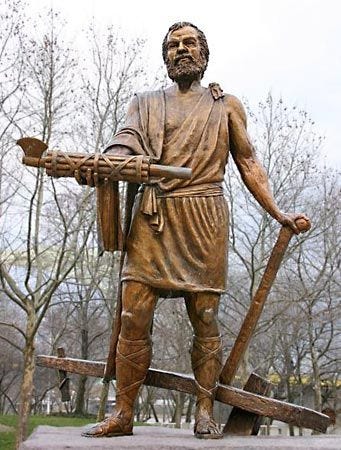Joseph Farington was an English painter in the late eighteenth century. Benjamin West was an American-born painter who had relocated to London before the Revolutionary War and remained there. West became a favorite of George III, on account of his painting skills and because he provided insight into Americans’ thinking. West knew Farington, who kept a diary. In 1799, West recounted a conversation with George that had taken place after the British defeat at Yorktown but before the formal end of the war. Farington paraphrased: “The King began to talk about America. He asked West what would Washington do were America to be declared independent. West said he believed he would retire to a private situation. The King said if he did he would be the greatest man in the world.”
George anticipated the many others who marveled at Washington’s restraint in retiring from public life at the end of the war. He was likened to the Roman general Cincinnatus who returned to his farm upon defeating Rome’s enemies in the early days of the republic. Both men might have made themselves kings or dictators but didn’t. Their refusal revealed their attachment to republican ideals and the common weal.
There’s some question whether Cincinnatus was everything he was said to be. As for Washington, his self-denial was real enough but it meant less than King George thought.
George III understandably interpreted the actions of George W in the context the former knew best: English and European politics and history. In England and in Europe, it had often been the case that victorious military leaders seized the levers of political power. Julius Caesar had done so. William of Normandy had done so. Oliver Cromwell had done so. Why would Washington not do so?
Because Washington honored republican values. But also because he realized that making himself an American king or equivalent would be nearly impossible. Washington couldn’t seize control of the American government because there was no American government worth seizing.
The United States of America in 1783 were (not was) united in name mostly. The national government, under the Articles of Confederation, was akin to the modern United Nations General Assembly, where all countries are equal and resolutions have no binding authority. Indeed, each of the thirteen states held itself sovereign and independent of the others. Several called their chief executive “president” rather than governor. Benjamin Franklin served three terms as president of Pennsylvania.
The national government possessed no taxing power. It had to request money from the states, which might or might not honor the request. It had no power to regulate trade among the states. It had no power to raise an army, instead relying on the states to recruit troops. It had no independent executive but rather a chairman of Congress. It had no judiciary. It had no direct connection to individual Americans, only to their states.
Congress—alternatively called the Continental Congress or the Confederation Congress—essentially was the national government. And the members of Congress answered to the states. There were no officers of the government chosen by the nation at large or answerable to the nation at large. Again, this because there was no nation at large, in the thinking of most Americans, merely a collection of states.
If Washington had marched on Philadelphia with intent to seize the government, such as it was, Congress would have fled, as it had fled when the British took Philadelphia in 1777. Washington might have appropriated such cash as the government had on hand, but he would have had no way to raise more.
Marching on Philadelphia in 1783 to seize control of America would have made as little sense as marching on the UN headquarters in New York today to take control of the world. Just as power now resides in the separate nations, power then resided in the separate states.
If Washington had wanted to make himself head of the civil government, he would have had to re-create the civil government. Which of course is what he and the other delegates to the constitutional convention of 1787 did. Washington proceeded to become head of the new government, with the enthusiastic approval of most Americans.
It does no disrespect to Washington to say he wasn’t the Cincinnatus he was made out to be. If anything, it acknowledges his insight in seeing that the prize he was said to deny himself was no prize at all.
Anyway, each man wound up with an American city named for him.



